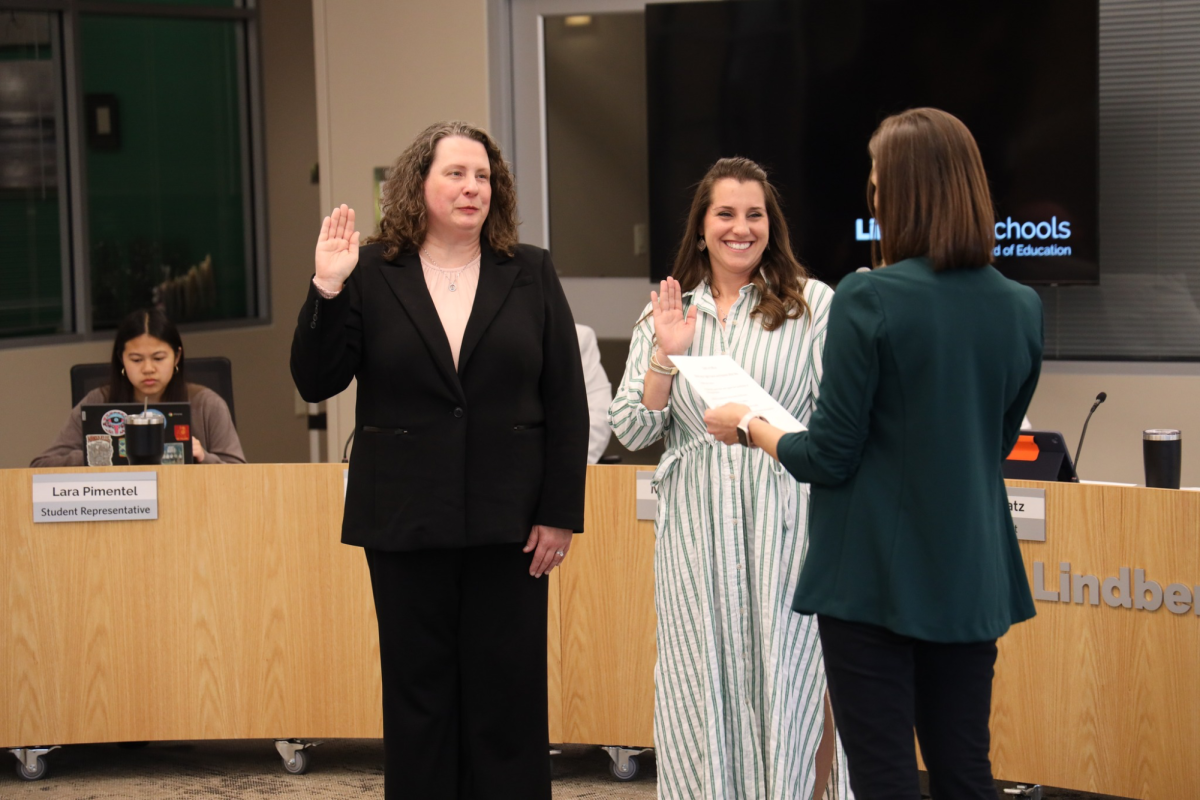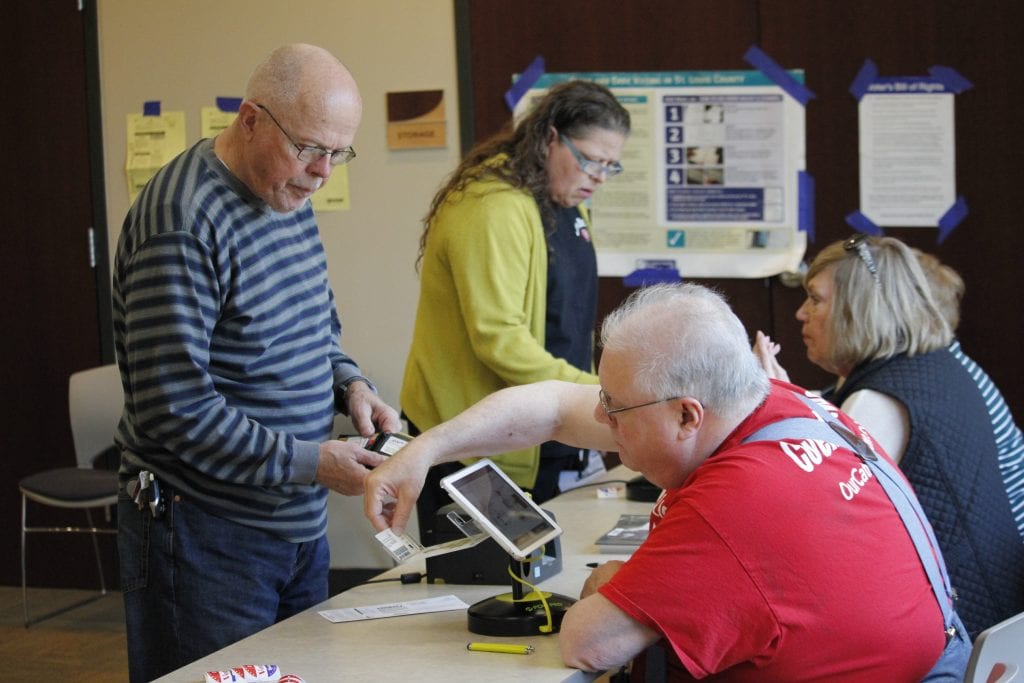By Gloria Lloyd
News Editor
glorialloyd@callnewspapers.com
To read a related article about Bell at the town hall, click here.
St. Louis County Prosecuting Attorney Wesley Bell hasn’t yet reached a year in office, but he’s already emphasizing how he is taking a different view of criminal justice reform.
Bell, a Democrat, talked about his new philosophy and how he has done things differently earlier this year in a town hall held by legislators Reps. Jim Murphy and Michael O’Donnell, who are both Republicans from Oakville. The two lawmakers are hosting a followup town hall this week at the Grant’s View Library along with Rep. David Gregory, R-Sunset Hills.
At the previous town hall at the Cliff Cave Library in Oakville, Bell focused on his new way of doing things in the prosecutor’s office rather than the “old guard” of former Prosecuting Attorney Robert McCulloch, who he defeated in the August Democratic primary last year.
But he said that his wave of reforms was misunderstood by residents, and misrepresented by the media.
“If you know anything about me, I’m big on community engagement,” Bell said. “I think that sometimes you may have heard that the Post-Dispatch and other media, they don’t always get it right, so I’d like to answer a couple direct questions.”
To that end, Bell brought along his Director of Community Engagement Capt. Clay Farmer, formerly of the North County Police Cooperative, and his Chief of Staff Sam Alton.
The misunderstandings Bell said he debuted with are part of what inspired the town hall. Murphy filed legislation that would allow the state attorney general to override local prosecutors who decide not to pursue cases that police have recommended for charges.
“When Mr. Bell took office and they reported he isn’t going to prosecute anything, he’s going to give everybody a free ride, I got a little upset,” Murphy said. “The first thing I did was I ran off and I filed a bill.”
But after meeting with Bell, Murphy said he and the prosecutor came to an understanding about how Bell simply wants to focus on the most violent crimes rather than smaller ones like marijuana possession. And the lawmaker invited Bell to address his constituents in Oakville.
The new prosecutor said he is the son of a police officer — his father is a retired sergeant from the Atlanta Police Department — and has no ill will toward police officers: “I know that’s the toughest job in the world.”
Bell said that he is unique among county prosecutors in handling cases from 55 separate police departments. One of his first acts in office was to go around and visit with “just about every” police chief in the county and see what they would like to see changed as far as how the county handles cases. He said he wanted to “keep that open line of communication” with individual departments because “if we refuse something and say we’re not going to prosecute it, the story doesn’t end — you can call me, you can call Sam,” and explain why the case merits charges higher or lower than prosecutors were considering.
“So they may not be able to do everything they want to all the time, but they’ll know why,” Bell said. “And that actually makes them better officers when they know these are the things we need to do, this is why we couldn’t take this particular case. But if you go and get this probable cause or this particular evidence or interview this witness, we will prosecute that case. So we have that open line of communication.”
Bell noted that although one in four Americans suffer from mental-health issues, 50 to 60 percent of those in the justice system are affected. And roughly 80 percent of defendants need drug treatment.
The idea of focusing on violence has a practical purpose and a monetary one.
Bell believes the county prosecutor’s office is “one of the most understaffed in the country,” and decisions have to be made about which priorities to spend prosecutors’ time on. Alton said it costs taxpayers $23,000 a year to imprison someone at the county jail, the Justice Center, and the office had 266 case files per prosecutor at the time of the town hall. Over several years, Bell said the homicide rate has gone up 100 percent.
“It all comes back to public safety,” Bell said of focusing on carjacking and murder.
An example Bell cited was his office’s successful prosecution in February of Trenton Forster, who shot and killed police Officer Blake Snyder in 2016.
Prosecuting a small marijuana possession case takes 40 to 50 prosecutor hours the office won’t have to focus on trials.
“The Snyder trial, our entire office revved up to make sure we had all the resources to bring to bear to make sure that that individual was given justice and was in prison, we did that,” Bell said. “We don’t want to have to focus those same resources on small amounts of marijuana. We want to treat ‘em and get them before they progress to more serious stuff.”
And the tactic also makes sense because like Forster, people rarely jump straight into committing violent crimes, he said.
They often start with low-level drug possession and property crimes, then get hardened while in prison and come back out committing violent crimes.
“Let’s make less criminals and less victims, let’s keep the people who don’t need to be in prison out of prison,” Bell said. “Because I want to make sure we’ve got the space for the people who need it.”
He said the diversion program is a “carrot and a stick,” with the carrot of a clean record if treatment is completed. But the stick of jail time is still there unless the person finishes the program. It’s overseen by county Circuit Judge Michael Burton.
“We’re trying to catch them here at the nonviolent stage — give them the help that they need, the treatment that they need,” he said, noting that sometimes suspects are also victims in other crimes in what becomes a vicious cycle.
As one example, if a person is convicted of low-level marijuana or heroin possession, they will get probation but will have a conviction on their record that will prevent them from being able to get jobs or housing, potentially sending them into that circle of violence with no other options.
Bell said he is continuing a program with partners like Affinia Healthcare who are “not charging you all as taxpayers one dime” to provide mental-health and drug treatment to low-level offenders.
“We’re treating them and then they are significantly less likely to reoffend,” Bell said. “A lot of officers know they’re arresting the same people over and over because they have the same underlying issues.”
But Bell emphasized that these opportunities are only offered to nonviolent offenders and when it “crosses over to violence, that’s a different ball game.” His office won’t offer diversion and treatment for violent offenders.
“I have two boys — when I think about their safety it’s not the person on the street that’s smoking a small amount of marijuana that’s concerning me, it’s people with a gun, it’s places I don’t want them to go because I’m concerned as a parent,” Bell said.






























